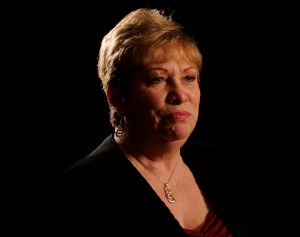Measures to help small firms in Chancellor George Osborne’s Budget this afternoon were immediately welcomed by Bristol’s business community and business advisors. 
Phil Smith, pictured right, managing director of Business West – the organisation that runs the Bristol Chamber of Commerce and the Bristol Initiative – said the Chancellor had delivered what will be remembered as a “thin but business-pleasing” Budget. Permanent savings in business rates would be applauded by thousands of small firms across the South West, he said.
“We also saw further cuts to Corporation and Capital Gains Tax rates, a freeze in fuel duty and a devolution deal worth £900m to the West of England region,” he added.
“Fears of a potential hike in taxes were unfounded and businesses will breathe a sigh of relief. However there is some worry around the downgrades of forecasts to UK economic growth and productivity, which raises some concerns about our medium term economic health.”
 CBI South West director Deborah Waddell, pictured left, was encouraged by the devolution deal for the West of England.
CBI South West director Deborah Waddell, pictured left, was encouraged by the devolution deal for the West of England.
She said: “As one of the most productive economic areas outside of London, this deal can build on the area’s strengths in advanced engineering, tech, digital and professional services by improving skills provision as well as physical and digital infrastructure.
“We’re particularly pleased that the National Infrastructure Commission will look include the South West in its 5G review.
“It is vital that local leaders work closely with the business community to make the most of this opportunity.” 
Julian Cockwell, pictured right, head of tax for the South West at accountancy group KPMG, also highlighted the attention the Chancellor gave to the region.
“With the success of business in the South West previously hindered thanks to our infrastructure, businesses will be rejoicing at the announcement that Severn Bridge toll crossings are to be halved by 2018,” he said.
“While the announcement brought about laughs from the floor, estimates show that the tolls currently cost the South and West up to £100m in lost trade. The region’s businesses will also benefit from faster internet, with the promise of a £14.5m grant for ultrafast broadband.
“Our SMEs will welcome the announcement of lower stamp duty and corporation tax and double the business relief rate for small firms. Better still, the increase in the personal tax allowance and no movement on rumoured cuts to Entrepreneurs’ Relief, will help offset the abolition of dividend relief, incentivising small enterprises in the region to keep growing.”
 Head of international law firm Osborne Clarke’s Bristol office, Peter Clough, pictured left, welcomed the improvements to the region’s road and rail network.
Head of international law firm Osborne Clarke’s Bristol office, Peter Clough, pictured left, welcomed the improvements to the region’s road and rail network.
“Transport issues are right at the top of the agenda for businesses in our region,” he said.
“The Severn Crossing plays a key role in the local economy so the plan to halve bridge tolls in 2018 is very welcome in terms of providing significant savings for both individual and business travellers.
“We heard much in today’s Budget about the Northern Powerhouse, as well as other evolving regional collaborations, and this announcement on bridge tolls will provide a timely boost to the Severn/Great Western powerhouse concept by increasing connectivity between Bristol, Newport and Cardiff.
“Likewise the £3m earmarked for improvements to our railway stations is most welcome, as is the £500,000 to fund a study into the new M4 junction 18a at what is a traditional traffic bottleneck to the north and east of Bristol.”
Chancellor George Osborne’s announcement to halve the tolls on the two Severn Crossings in this afternoon’s Budget was also welcomed by Bruton Knowles Bristol office team leader Paul Matthews, pictured right. 
He said: “We welcome the Chancellor’s decision to halve Severn Bridge tolls from 2018 as this represents a significant saving on business costs and will also give the Great Western Cities concept a major shot in the arm, increasing connectivity between Bristol, Newport and Cardiff.
“The present toll levels are one of the biggest obstacles to greater cooperation between these cities and reducing them by half will give the Great Western Cities concept greater traction on both sides of the Severn.”
Thatchers Cider managing director Martin Thatcher, pictured below, was pleased with the freeze in cider duty, which he said was “in recognition of the role that cidermakers play in the rural economy”.
 But he added: “We are nonetheless disappointed that he was unable to respond to the industry’s wider concerns regarding the difficult conditions facing many cidermakers in the UK. Here at Thatchers we continue to invest for future generations as did previous generations of my family.”
But he added: “We are nonetheless disappointed that he was unable to respond to the industry’s wider concerns regarding the difficult conditions facing many cidermakers in the UK. Here at Thatchers we continue to invest for future generations as did previous generations of my family.”
Thatchers has been producing craft cider for 111 years at Sandford, near Weston-super-Mare. It now makes 50m litres a year using locally grown apples.
But Roger Jones, pictured right, managing director of Bath Ales – which produces 20,000 barrels annually and has its own bottling plant and brewery shop at Warmley – dismissed the Budget as a “lot of froth and not enough body”. 
“I’m not sure there’s much in this for the team at Bath Ales or our customers,” he said. “Beer duty hasn’t increased but it’s not enough. We’re still not on a level playing field with cider on duty. The freeze is not enough to benefit consumers and I think the Chancellor should be doing more to champion the British brewing industry.
“Freezes on fuel duty and cuts to Corporation Tax are small steps to help businesses like ours, though bigger steps are needed to support businesses that have lots of employees in very different roles.”
However, Ann Carlton, pictured below left, director of private client based in regional law firm Thrings’ office, said firms would be happy with some pro-business measures, “not least the 600,000 which are being taken out of business rates, the 250,000 which will pay less in business rates and the nine out of 10 which will pay less stamp duty or remain unaffected due to the ‘slicing’ effect of the rates bringing these in line with the residential property regime”.
She added: “These new rates apply from midnight tonight with transitional provisions where contracts have already been exchanged but completion has not taken place. But while this Budget initially looks promising for small businesses, much scrutiny of the small print will be needed.”
But she said: “Many will view th is as a Budget which was driven towards the UK staying in Europe, with Mr Osborne stating that the outlook for the UK economy would be worse if Britain voted to leave the EU and warning that a Brexit could have a negative impact on business activity and confidence.”
is as a Budget which was driven towards the UK staying in Europe, with Mr Osborne stating that the outlook for the UK economy would be worse if Britain voted to leave the EU and warning that a Brexit could have a negative impact on business activity and confidence.”
With entrepreneurs’ relief (ER) used as a key way funding high-growth firms, particularly in the tech sector, changes announced in the Budget were also welcomed.
ER will be extended to external investors in unlisted trading companies, so allowing investors who acquired newly issued shares in these companies - and who hold shares for at least three years - to be taxed at 10% on their sale subject to a £10m lifetime limit. 
Osborne Clarke tax partner Erika Jupe, pictured right, said: “Clearly, the business community will be relieved to hear that the Chancellor hasn’t taken any radical steps with ER. The extension to the ER rules will be viewed positively but there will be disappointment in some quarters that the change does not cover employees or directors.
“There are also a number of technical changes to the entrepreneurs’ relief rules, but these are good news for investors. They reverse the effect of amendments made in 2015 which were originally aimed at combating tax avoidance, but which resulted in relief not being available to investors in genuine commercial structures where there was no tax avoidance motive.”
 Tax director in accountants Grant Thornton’s Bristol office, Jenny Batchelor, pictured left, said many of the business-friendly measures announced by the Chancellor had made the tax system even more complex.
Tax director in accountants Grant Thornton’s Bristol office, Jenny Batchelor, pictured left, said many of the business-friendly measures announced by the Chancellor had made the tax system even more complex.
“Although aimed at benefitting business, a lot of these will require more rules and regulations,” she said. “Radical simplification and greater transparency and understanding would increase productivity and compliance – a win-win for the economy and society more wholly.
“Complexity has serious commercial implications for business. We know, for instance, that more than half of businesses say the current tax system slows down commercial decisions – with mid-sized businesses the most affected by this. It’s therefore disappointing that the Chancellor did not use today’s opportunity to push for real and material change to simplify the system.”
There was relief at one measure the Chancellor did not include – devolving Air Passenger Duty to Wales. West of England business leaders had been concerned that such a move would have allowed Cardiff Airport to scrap the duty and use that to attempt to lure passengers and airlines away from Bristol Airport.
Bristol Chamber of Commerce and Initiative chief executive James Durie, pictured below, said: “We are pleased that the Chancellor has listened to the business voices from right across the South West. 
“We have been expressing concern that this move would have impacted negatively on our regional airports, in particular Bristol Airport, and potentially reduce our connectivity with global markets.
“We seek measures that will make the South West and indeed the whole of the UK more successful, not ones that change the economic playing field and just transfer existing activity across boundaries. Together with our chamber of commerce colleagues from right across the South West, we wrote to George Osborne asking him not to push through with this change, and we are very glad he has listened.”






























